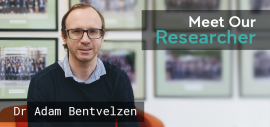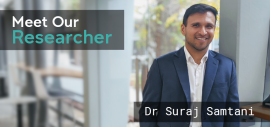Blog: The Brain Dialogues
Josie Bigland | Meet Our Researcher Series
Josie Bigland is working toward becoming a Clinical Psychologist, with a personal goal of giving back to the community; specifically, families enduring hardship when it comes to managing the health of a loved one affected by dementia. Her experience with quality control of data across CHeBA’s longitudinal studies has revealed to her the importance of exercising throughout the lifespan to maintain cognitive health.
How did you first get into researching the ageing brain?
As a self-supporting student, I was looking for a research assistant position to get me through university whilst… Read More
Diagnosing Dementia
Dr Meredith Gresham
Study Coordinator
Many people currently living with dementia never receive a formal diagnosis. Although exact figures for Australia are unknown, it is estimated that between 44 and 70% of people with dementia in the UK and Canada – countries with similar health care systems to ours – remain undiagnosed. According to Alzheimer’s Disease International this ‘treatment gap’ is even greater in low and middle income countries; one study in India suggested 90% of people remain undiagnosed.
The fear of dementia sometimes discourages people from seeking a diagnosis. Sometimes… Read More
Dr Rebecca Koncz | Meet Our Researcher Series
Dr Rebecca Koncz’s research explores the pathophysiological mechanisms of Alzheimer’s disease, particularly amyloid accumulation, as a hallmark feature of the disease. Utilising data collected from CHeBA’s Older Australian Twins Study, she is attempting to answer the classic “nature vs nurture” question – specifically, what proportion of amyloid burden is attributable to genes, and what proportion is determined by environmental, or modifiable, risk factors.
How did you get into researching the ageing brain?
I’ve always had an interest in the brain sciences, having completed a major in… Read More
Julia Riches | Meet Our Researcher Series
The participants of CHeBA’s Sydney Centenarian Study have quite literally a century’s worth of knowledge and possibly the most diversified life experience of us all. Experiencing the impacts of World Wars, countless technological innovations and the unusual circumstances of a global pandemic. Their invaluable insights confirmed to Julia Riches that CHeBA was the place to be.
How did you get into researching the ageing brain?
I completed my undergraduate studies at the University of Queensland and started working as a Research Assistant there, coincidently, on CHeBA’s Social Cognition… Read More
Dr Karen Croot | Meet Our Researcher Series
As our understanding of brain health expands rapidly, more and more individuals are becoming extremely health conscious. This includes a surge in demand for access to cognitive health assessment. Dr Karen Croot and her fellow researchers on CHeBA’s CogSCAN project aim to address this demand and evaluate the efficacy of new methods of testing to diagnose cognitive disorders.
How did you first get into researching the ageing brain?
My most inspiring lecturer when I was an undergraduate student was a neuropsychology professor, he talked about the work that he was doing to understand brain… Read More
Rhiagh Cleary | Meet Our Researcher Series
Further understanding of social cognition, and how it changes across the lifespan and interacts with cognitive decline, is essential for underpinning risk factors for neurodegenerative diseases such as dementia. Rhiagh Cleary, Research Assistant within CHeBA’s Social Cognition Study, hopes to achieve exactly this, to strengthen the ability of families to cope with and potentially inhibit the effects of such diseases on loved ones.
How did you get into researching the ageing brain?
Trial and error. I followed both what I was interested in and the opportunities that arose. My first career… Read More
Russell Chander | Meet Our Researcher Series
There is a large body of evidence to suggest that our ability to socialise and maintain positive relationships throughout the lifespan is affected by, and can have an effect on, ageing. Becoming part of an international collaborative effort to better understand the impact of social skills in later life on cognitive decline and dementia is what motivates Russell Chander; PhD student at CHeBA.
How did you get into researching the ageing brain?
I became aware of a Research Assistant job through a friend from university that was working at a Neurology clinic. This would be the first job I… Read More
Tiffany Chau | Meet Our Researcher Series
CHeBA’s Maintain Your Brain trial aims to target and mitigate risk factors for dementia and Alzheimer’s disease using e-health interventions. It is the largest clinical trial of its kind. If the onset of these diseases can be postponed by at least two years, incidence would be reduced by 20% and these numbers increase rapidly as years of delay is extended. Research Assistant Tiffany Chau hopes Maintain Your Brain can help achieve reduced prevalence rates and enhance cognitive health in older age.
How did you first get into researching the ageing brain?
I studied a Bachelor of… Read More
Dr Adam Bentvelzen | Meet Our Researcher Series
The context of healthcare has certainly shifted in light of the COVID-19 pandemic and there is now a huge demand for flexibility when it comes to accessing practitioners and treatment. Dr Adam Bentvelzen is pioneering the way for alternative avenues of accessibility to healthcare services, particularly phone-based cognitive screening. He has been investigating this as a means of assessing patients with possible dementia who are geographically isolated or physically limited. This method has been successfully implemented for over ten years with participants in CHeBA’s Sydney Memory and Ageing… Read More
Dr Suraj Samtani | Meet Our Researcher Series
CHeBA is concerned with the big picture; achieving successful healthy ageing for all. The Centre’s international collaborative efforts present an opportunity for researchers to investigate these interests on a global scale which has exciting implications. For Dr Suraj Samtani, this brings him one step closer to understanding the implications of social interaction as a protective factor against dementia and cognitive decline.
How did you get into researching the ageing brain?
I have always wanted to have a direct positive impact on people’s lives. This interest led me to complete a… Read More










